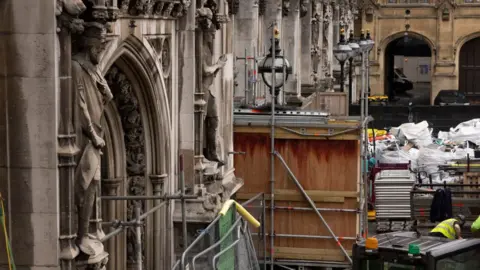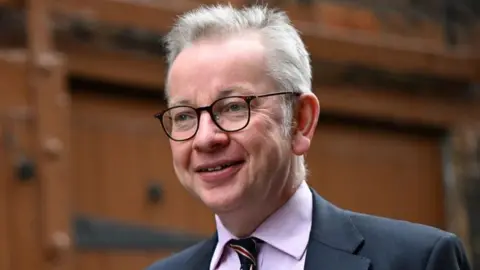Move out of London during Parliament renovation, Michael Gove tells peers
 Getty Images
Getty ImagesThe government has vetoed a proposal for the House of Lords to temporarily relocate to a building opposite Parliament - and told peers to move outside London instead.
The House of Lords could be forced to leave Parliament while extensive restoration works are carried out.
Peers wanted to use the Queen Elizabeth II Centre in Westminster - minutes away from Parliament.
But Levelling Up Secretary Michael Gove has said he will not support the plans.
His department owns the freehold and the body which runs the QEII Centre - a large conference and exhibition space with views of Big Ben and Westminster Abbey.
In a letter seen by the BBC, Mr Gove said he "cannot endorse" a plan for peers to "decamp to a temporary home a mere 200 yards from the Palace of Westminster".
Mr Gove suggested they looked at alternative buildings in the North of England, the Midlands, the South West, Scotland or Wales.
But crossbench peer Baroness Hayman called his plans "bonkerooney", claiming it was "punishment" from the government for recent rebellions against its legislation when it came to the Lords.
 Getty Images
Getty ImagesThe restoration of Parliament will cost billions - but the price will go up considerably if MPs or peers stay put in the building.
Earlier this year, a report said the restoration could take up to 76 years if MPs were not moved, with the price tag for repairs reaching £22bn.
The project's sponsor body and delivery authority said the cheapest option would involve a "full decant" of the palace for between 12 and 20 years, leading to the work costing between £7bn and £13bn.
This method would cut the restoration time to between 19 and 28 years.
The Lords had begun working on plans for a relocation to the QEII.
But Mr Gove told the Lord Speaker Lord McFall: "It is clear to me that the House of Lords moving elsewhere, even for a temporary period, would be widely welcomed.
"I know cities and towns across the UK would be pleased to extend their hospitality to peers," he added.
Any plan will be subject to a final vote by Parliament.
The idea of moving the Upper Chamber out of London first emerged in January 2020.
Downing Street said it would demonstrate its commitment to levelling up to spread decision-making outside London.
York was considered as an option - but several leading peers said it was impractical to separate the Lords from the Commons.
The then Lord Speaker, Lord Fowler, said it was "gesture politics" while Commons Speaker Sir Lindsay Hoyle said the idea was "great PR" but questioned how it would work.
By the summer of that year, the relocation of peers to York was effectively axed.
After the letter was published, Baroness Hayman told BBC Radio 4's The World This Weekend that Mr Gove's plan was "worse than" tokenism and not a "sensible or grown-up way to address" the problem.
She added: "I think it's more that the government is very grumpy with the House of Lords at the moment because we did a job during the last session and we actually challenged and made the government think again on important legislation.
"A government that has a big majority in the House of Commons always thinks that because it's easy there it should be easy everywhere. So I think they are really quite angry with the House of Lords at the moment and therefore, kick them out, it's punishment."
